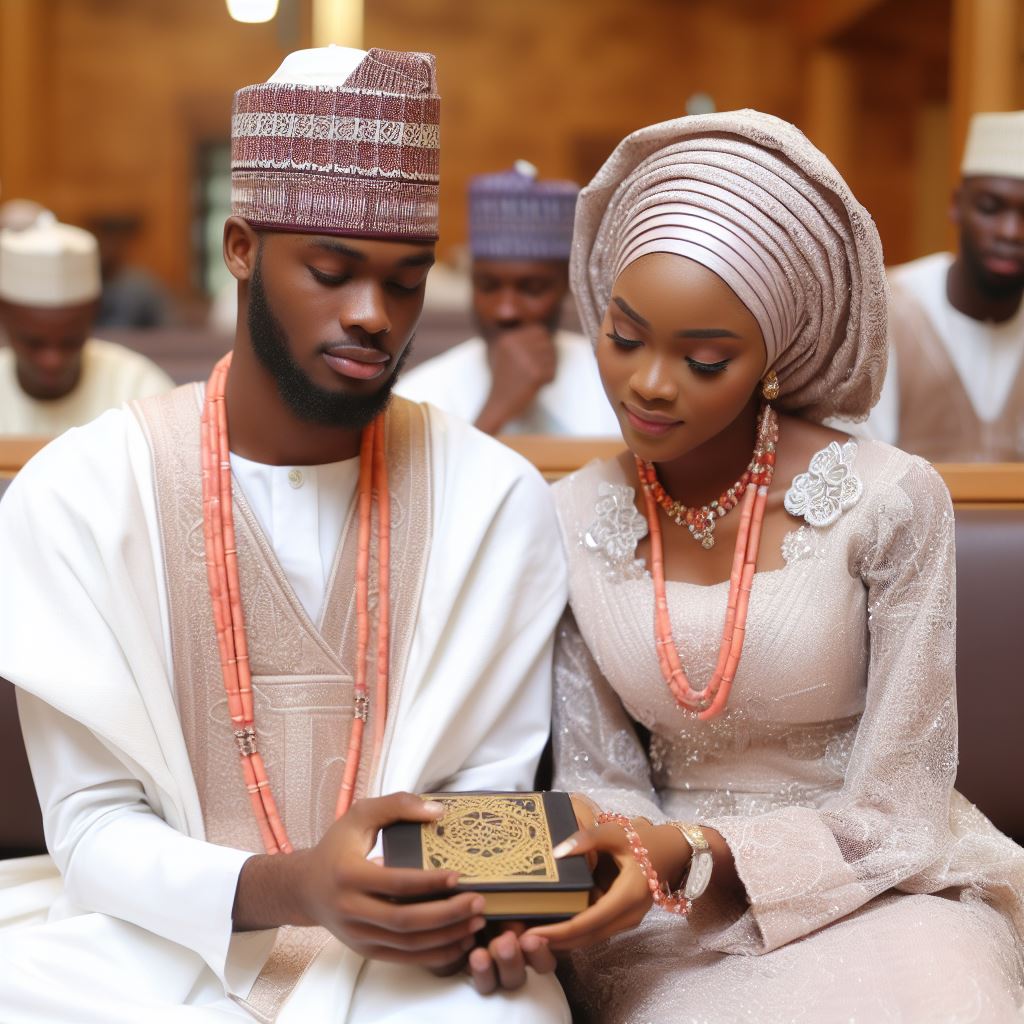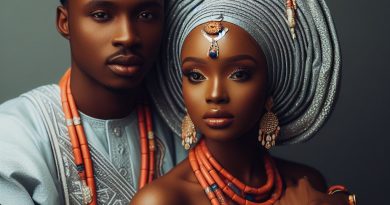The Role of Walis in Islamic Matrimony: A Deep Dive
Last Updated on October 13, 2023
Introduction
Islamic matrimony is a sacred union between a man and a woman in accordance with Islamic principles.
The role of Walis, or guardians, is crucial in this process.
Walis are appointed by the bride and groom to ensure the marriage contract is conducted in a lawful and ethical manner.
They act as representatives and protectors of the couple’s rights and interests.
In Nigeria, Islamic matrimony holds great significance due to the country’s large Muslim population.
It is seen as a way to strengthen family ties, preserve cultural values, and maintain social harmony.
When it comes to the role of Walis, their responsibilities include conducting the marriage contract, verifying the compatibility of the couple, and ensuring the consent of both parties.
They also negotiate the Mahr, a gift given by the groom to the bride as a sign of his commitment.
Moreover, Walis provide guidance and counseling to the couple, reassuring them of their rights, responsibilities, and obligations in marriage.
They play a vital role in resolving disputes and advocating for fairness and justice within the marital relationship.
Basically, the role of Walis in Islamic matrimony is significant as they uphold the principles of Islamic law, safeguard the rights of the couple, and facilitate a harmonious and successful marriage.
They ensure the marriage conforms to religious and societal expectations.
The Concept of Walis in Islamic Matrimony
Definition and significance of Walis
A Wali is a male guardian who represents the bride during the marriage contract in Islamic Matrimony.
The Wali ensures the bride’s welfare and ensures the marriage conforms to Islamic principles.
Historical and cultural context of Walis in Nigeria
In Nigeria, the practice of having a Wali dates back to pre-Islamic traditions.
The Wali not only acts as a guardian but also as a symbol of the bride’s family’s approval and support for the marriage.
Comparison of Walis in traditional and modern Islamic weddings
In traditional Islamic weddings, Walis play a more prominent role.
They are directly involved in the negotiation of the marriage contract.
In modern times, the role of the Wali has evolved, and their involvement varies based on cultural and individual preferences.
Role of Walis in upholding Islamic principles and values during the marriage process
The role of the Wali goes beyond ceremonial significance.
They ensure that the marriage adheres to Islamic principles, such as the consent of both parties, fair and just terms, and compatibility between the couple.
Walis also help in resolving any potential disputes that may arise during the marriage process.
The role of Walis in Islamic Matrimony is of utmost importance.
They provide guidance, support, and protection to the bride, ensuring that the marriage aligns with Islamic principles and values.
Read: Marriage Certificate in Nigeria: A Step-by-Step Guide
Rights and Responsibilities of Walis in Islamic Matrimony
Legal position and authority of Walis in an Islamic marriage contract
- Walis hold a legally recognized position in Islamic marriage contracts.
- They have the authority to approve or reject marriage proposals on behalf of the bride.
- Their consent is mandatory for the validity of the marriage.
Decision-making power and consent of Walis in the marriage process
- Walis possess decision-making power for the bride’s marriage.
- They play a crucial role in providing consent for the proposal.
- Without the consent of the Walis, the marriage cannot proceed.
Ensuring the suitability of the prospective spouse
- Walis are responsible for ensuring the compatibility and suitability of the prospective spouse.
- They evaluate the character, faith, and values of the potential partner.
- This ensures a harmonious and successful marital relationship.
Safeguarding the rights and interests of the bride
- Walis act as guardians of the bride, ensuring her rights and interests are protected.
- They negotiate the terms of the marriage contract, including financial and personal rights of the bride.
- Walis ensure the bride’s well-being and security throughout the marriage.
Handling disputes and conflicts during the marriage process
- Walis play a role in resolving conflicts and disputes that may arise during the marriage process.
- They provide guidance and support to the couple to find amicable solutions.
- Walis act as mediators to maintain a healthy and peaceful marital relationship.
By understanding the rights and responsibilities of Walis in Islamic matrimony, we can appreciate their vital role in ensuring the well-being and success of marriages.
Walis have legal authority in approving or rejecting marriage proposals on behalf of the bride, and their consent is essential for the validity of the marriage.
They also hold decision-making power, ensuring the suitability of the prospective spouse and safeguarding the rights and interests of the bride.
Additionally, Walis are responsible for handling disputes and conflicts that may arise during the marriage process, acting as mediators to maintain a harmonious relationship.
Through their involvement, Walis contribute to the strength and stability of Islamic marriages.
Read: Islamic Marital Duties: A Guide for Nigerian Couples
Challenges and Evolving Role of Walis in Contemporary Nigerian Society
Influence of cultural and traditional practices on the role of Walis
- Cultural and traditional practices greatly impact the role of Walis in Islamic matrimony.
- These practices often emphasize the authority and decision-making power of Walis.
- Some traditions restrict the role of women in the marriage process, limiting their agency.
- The influence of cultural and traditional practices can sometimes overshadow the original Islamic principles.
Addressing the issue of forced marriages and consent in Islamic matrimony
- Forced marriages are a significant challenge in contemporary Nigerian society.
- It is crucial to ensure that consent is obtained from all parties involved in the marriage.
- Walis should play a role in protecting the rights and well-being of those entering into marriage.
- Education and awareness programs can help address the issue of forced marriages and promote consent.
Ensuring inclusivity and gender equity in the role of Walis
- The role of Walis must be inclusive and respectful of gender equality.
- In many cases, women are excluded from being Walis, leading to an imbalance of power.
- We should actively challenge patriarchal norms and ensure women’s participation as Walis.
- Inclusivity and gender equity can strengthen the institution of marriage in Nigerian society.
Balancing Islamic principles with societal changes and individual freedoms
- The role of Walis should adapt to societal changes and respect individual freedoms.
- It is essential to strike a balance between Islamic principles and evolving social dynamics.
- Walis should ensure that their decisions align with the principles of justice and fair treatment.
- Flexibility and openness to change are necessary to address the challenges faced by Walis in contemporary Nigerian society.
Generally, the role of Walis in Islamic matrimony in contemporary Nigerian society faces various challenges and must evolve to meet the needs of a changing world.
The influence of cultural and traditional practices, addressing forced marriages and consent, ensuring inclusivity and gender equity, and balancing Islamic principles with societal changes are vital aspects to consider.
By addressing these challenges, the role of Walis can embrace inclusivity, protect individual freedoms, and enhance the institution of marriage in Nigerian society.
Read: How to Prepare for a Halal Muslim Wedding in Nigeria

The Future of Walis in Islamic Matrimony
Adaptation of the role of Walis in modern times
- As society evolves, the role of Walis in Islamic matrimony must also adapt to changing circumstances.
- Traditional norms may need to be reevaluated to ensure their relevance and effectiveness in contemporary contexts.
- Walis can play a crucial role in facilitating compatibility between potential couples by incorporating more inclusive criteria.
- The focus should shift from merely acting as gatekeepers to becoming facilitators of healthy marriages.
- Recognizing the unique needs and aspirations of each individual is key in modernizing the role of Walis.
- This approach can foster stronger relationships grounded in mutual understanding and shared values.
Making the role of Walis more transparent and accountable
- Transparency is essential to ensure that the actions and decisions of Walis are fair and unbiased.
- Establishing clear guidelines and standards can promote accountability within the role of Walis.
- Walis should be required to disclose any potential conflicts of interest that may influence their decisions.
- Regular evaluation and feedback mechanisms can help monitor the performance of Walis and ensure their adherence to ethical principles.
- The inclusion of legal provisions to protect the rights of individuals involved in the marriage process is crucial.
- By making the role of Walis more transparent and accountable, trust and confidence in the process can be enhanced.
Educational initiatives to raise awareness about the rights and responsibilities of Walis
- Many individuals, particularly women, may not be fully aware of their rights and the role of Walis in Islamic matrimony.
- Educational initiatives can help bridge this knowledge gap by providing comprehensive information.
- Conduct workshops, seminars, and educational campaigns to empower individuals with knowledge about their rights and the Walis’ role.
- The dissemination of accurate and accessible resources can empower individuals to make informed decisions.
- Collaboration with religious scholars and community leaders can ensure the dissemination of accurate and authentic information.
- By raising awareness, individuals can actively participate in the marriage process and assert their rights.
Embracing diversity and cultural variations within Islamic matrimony practices
- Islamic matrimony practices vary across different cultures and regions.
- It is crucial to recognize and respect these variations while upholding the essence of Islamic principles.
- Walis should adapt their role to accommodate diverse cultural practices without compromising the core values of Islam.
- Efforts should be made to foster inclusivity and eliminate discrimination based on cultural differences.
- Through understanding and acceptance, the role of Walis can foster unity and harmony within the Muslim community.
- By embracing diversity, Islamic matrimony practices can evolve to be more inclusive and representative of the global Muslim population.
Essentially, the future of Walis in Islamic matrimony lies in their ability to adapt, be transparent and accountable, educate individuals, and embrace diversity.
By incorporating these factors into their role, Walis can contribute to the establishment of healthy and harmonious marriages within the framework of Islamic principles.
Read: The Importance of Nikah: Marriage in Islamic Tradition
Conclusion
Walis play a crucial role in Islamic matrimony.
They are responsible for ensuring the marriage contract is executed according to Islamic principles.
The Walis’ involvement is based on the Quranic verse that emphasizes the importance of their role in the marriage process.
It is essential to maintain the integrity of Islamic principles when it comes to the role of Walis.
They must consistently prioritize the individuals’ well-being and oversee the marriage to ensure it complies with halal principles.
However, the role of Walis in Nigerian society is evolving.
It is essential to carry out further research and gain a comprehensive understanding of the changes taking place.
This will help us adapt and ensure that the evolving role of Walis aligns with Islamic teachings while catering to the needs and realities of Nigerian Muslims.
In a nutshell, Walis hold a vital position in Islamic matrimony, and upholding Islamic principles is crucial.
Further research is needed to understand and adapt to the changing role of Walis in Nigerian society.


